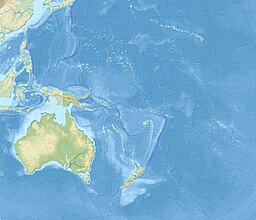Banc Capel is a guyot, or flat-topped underwater volcano, in the Coral Sea.
| Banc Capel | |
|---|---|
| Location | |
| Location | Coral Sea, in the South Pacific Ocean, near New Caledonia |
| Coordinates | 24°45.70′S 159°42.13′E / 24.76167°S 159.70217°E) [1] |
| Country | France |
| Geology | |
| Type | Guyot |
| Volcanic arc/chain | Lord Howe Seamount Chain |
Description
editBanc Capel is a guyot – a former atoll with steep sides and a flat top – and is swept by strong currents. There are no sandy or muddy substrates, the surface being occupied by rocks or gravel scree.[2]
Biodiversity
editBanc Capel is inhabited by species including Nassarius alabasteroides and Laurentaeglyphea.[3][4][5][2][6] It is dominated by sponges, including the genus Phloedictyon and gorgonians. Other decapods found in the same trawls including the slipper lobster Ibacus brucei, the crab Randallia and swimming crabs.[2]
Notes and references
edit- ^ "GeoHack". Retrieved 2014-09-25.
- ^ a b c Bertrand Richer de Forges (2006). "Découverte en mer du Corail d'une deuxième espèce de glyphéide (Crustacea, Decapoda, Glypheoidea)" (PDF). Zoosystema. 28 (1): 17–28.
- ^ Kool (2009). Miscellanea Malacologica 3 (5) : 97-100. World Register of Marine Species, Retrieved 18 April 2010.
- ^ Nassarius alabasteroides Kool, 2009. Retrieved through: World Register of Marine Species on 18 April 2010.
- ^ Nassarius alabasteroides Kool, 2009, Muséum national d'histoire naturelle, 2009
- ^ T. Y. Chan; M. Butler; A. MacDiarmid; A. Cockcroft & R. Wahle (2011). "Laurentaeglyphea neocaledonica". IUCN Red List of Threatened Species. 2011: e.T185043A8357202. doi:10.2305/IUCN.UK.2011-1.RLTS.T185043A8357202.en.
